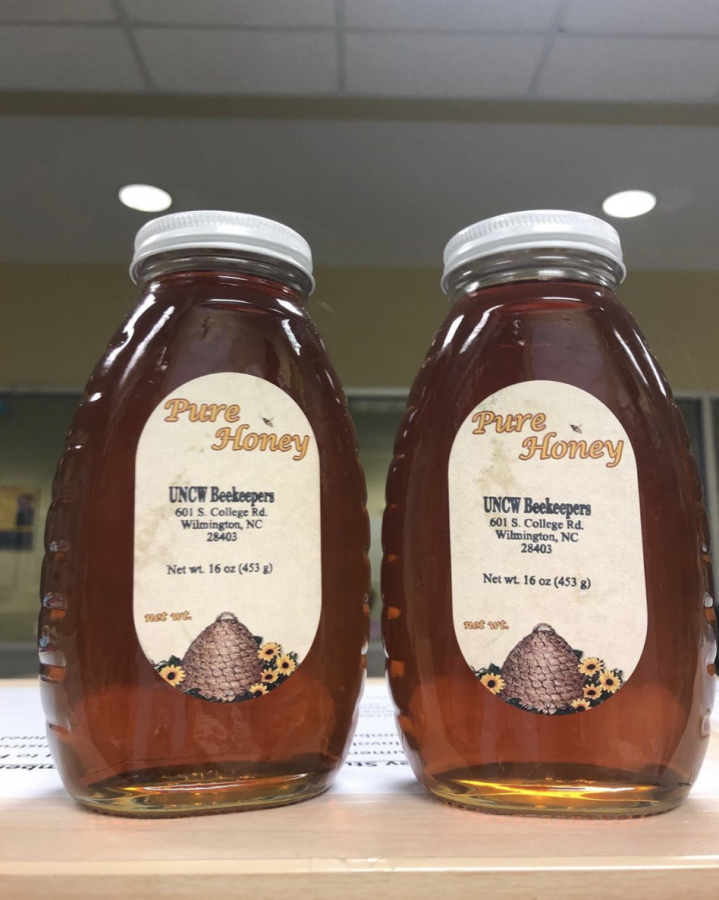EVS and UNCW Beekeepers set to sell honey on campus for the third year
UNCW Beekeepers
Some of the bottled honey that was sold last year on campus. One pound bottles are available for $9.50 at the POD markets on campus.
For the third year, the environmental sciences (EVS) department alongside Beekeepers (the bee club) at UNC Wilmington (UNCW) will be selling the honey they harvested and bottled at the Fisher POD market on campus. One pound bottles will be able for $9.50 starting this Wednesday.
Dr. Anthony Snider, a professor in the EVS department and co-faculty advisor for the bee club, wrote that UNCW currently houses six hives in the EVS apiary — according to Merriam-Webster, an apiary is “a place/collection of hives or colonies of bees kept for their honey.” According to Dr. Snider, the apiaries are located in a secluded back part of campus to ensure no disruption to people, cars and other campus activities.
This year they were able to harvest over 230 pounds of honey from four of their six hives on campus.
“It varies with the year and is weather dependent,” wrote Snider. “Too much or too little rain decreases honey production by the bees.”
Like most everything else on campus, the bee club and their honey harvesting operations have been affected by the coronavirus (COVID-19) pandemic.
“The virus, and the associated campus restrictions, have had a very disruptive influence on the whole annual beekeeping cycle,” wrote Snider. “I was not able to offer my introductory beekeeping class this fall and was not able to bring in students to help with the harvest process. The apiary was set up to teach students about honeybees and I hope we can get back to that soon. It’s a lot more fun working the bees when the apiary is full of students. The club co-advisor, Dr. Luo from Psychology, and I handled all the steps ourselves. I hope we can get back to normal next year.”
Typically, there are around five to 10 Beekeeper members involved each year with the harvest process.
“First we remove the boxes the bees have used to store honey,” wrote Snider. “Bees are hard-wired to store more honey than they need so we only take the surplus. We transport those boxes to a building on campus where we remove the wax capping the bees place on each cell of honey to keep out excess moisture. The bees store the honey in “frames,” which we place in an extractor (essentially a giant, slow centrifuge) and spin the honey out of the frames. We then strain and bottle the honey for sale in the PODS. We use a process that retains the natural pollen in the honey.”
There are several ways students can get involved in this process in the future.
“I normally teach two classes on campus, an introductory beekeeping class and a class on apiary management,” wrote Snider. “Students enrolled in those classes get to spend time in the apiary. UNCW also has a very strong beekeeping club that works with the hives as well. The best way to find out more about the club is to contact the president, Jacob Stasiewicz.”
Beekeepers, which was started in 2017, is dedicated to educating and managing honey bees on campus and Wilmington.
“We provide a space for people to learn about the pollination services, honey production, health benefits, economic benefits, and environmental benefits honey bees provide,” they wrote in their WaveLink description.
The club is also directly affiliated with the New Hanover County Beekeeping Association.
“North Carolina is the epicenter of beekeeping in the US,” wrote Snider. “We have more beekeepers than any other state. They are critical to the agricultural part of our economy, which depends on them for pollination. The apiculture program is designed to bring more young people into the practice of beekeeping. It’s one of the most fascinating hobbies in the world. It helps you pay attention to what is in bloom around you and what the weather is doing. Honeybee society is amazingly complex and fun to observe. Plus beekeeping produces honey for home consumption and sale.”









Sandy Wilson • Apr 25, 2022 at 10:17 am
Was wondering if there is a contact for Mr. Snider as I am a beekeeper in New Hanover county. Looking for a opportunity to support your work in regards to bees.
Sandy Wilson
910-465-6806
Dr. Snider • Sep 1, 2020 at 5:17 pm
I just noticed that the information I sent you has a typo, which snuck through into print! The article says UNCW has a strong beeping club. Again, it was my fault. That should be “beekeeping” club. Spell check must have overriden me.
Thanks,
Dr. Snider
Veronica Wernicke • Sep 1, 2020 at 6:37 pm
We have fixed this error, thanks for catching it.